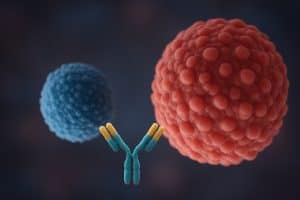
Researchers find possible new treatment for several cancers
pharmafile | April 23, 2021 | News story | Medical Communications | Cancer, The Institute of Cancer Research, cancer treatment, kidney cancer treatment, pharma, pharma news
Researchers at The Institute of Cancer Research (ICR) in London have discovered a new use for an ovarian and breast cancer drug that could make it effective against multiple other cancers, including a common form of kidney cancer.
The research is based on PBRM1 mutations in cancer cells, which are found in around half of all kidney cancer cases – affecting 6,000 people in the UK each year – as well as in mesothelioma, a cancer linked to asbestos exposure, and in some lung or bile duct cancers.
It was found that drugs known as PARP inhibitors killed cancer cells with a defect in the PBRM1 gene, by stripping the cells of their DNA defences so they could no longer repair damage to their genetic code.
Exposing PBRM1-defective cancer cells to PARP inhibitors also activated the body’s anti-cancer immune response, further contributing to the elimination of cancer cells.
Although PBRM1 gene defects are common, there are currently no treatments that target them.
ICR found that treating PBRM1-defective cancer cells with PARP inhibitors like rucaparib, olaparib or talazoparib in the lab had a ‘synthetic lethal’ effect, causing the cells to die.
They also found that using the PARP inhibitor talazoparib in mice with kidney tumours harbouring genetic defects in PBRM1 halted tumour growth.
The research has prompted the development of two Gustave Roussy-sponsored multi-centre Phase II clinical trials, looking at combining a PARP inhibitor with immunotherapy in patients with a range of cancers with faulty PBRM1 genes, including kidney, lung, bladder and bile duct cancers.
Professor Chris Lord, Study Co-Leader and Professor of Cancer Genomics at ICR in London, said: “Defects in the PBRM1 gene are common in various cancers, including half of all clear cell renal cell carcinomas, a common form of kidney cancer. Our findings suggest that cancers with faulty PBRM1 genes are sensitive to PARP inhibitors – drugs that strip cancer of its DNA defences.
“These findings are promising and our colleagues in Paris have already begun trials in patients based on this work. We’re hopeful that this could become a brand new genetically targeted approach to treating cancer, and could offer hope to patients with various cancer types including a common form of kidney cancer.”
Study Co-Leader Dr Sophie Postel-Vinay, at Gustave Roussy in Paris, added: “PBRM1 defects occur frequently on several cancer types, and have for long been ignored because we had no technology that allowed to look for them and diagnose them in the clinical practice, until recently. Our findings open novel perspectives for the treatment of these cancers for which there are currently limited treatment options.
“The fact that PARP inhibitors could also activate the immune response is important, as immunotherapies have brought unprecedented benefits in patients with tumour types where PBRM1 is frequently mutated, such as kidney or lung cancer.”
Jack Goddard
Related Content

LGC Group opens $100M Organic Chemistry Synthesis Centre of Excellence
LGC Group, a life sciences company, has opened its new Organic Chemistry Synthesis Centre of …

Central nervous system cancer metastases – the evolution of diagnostics and treatment
The current forms of immunotherapy, how T cell therapy works and what the future holds

BioMed X and Servier launch Europe’s first XSeed Labs to advance AI-powered antibody design
BioMed X and Servier have announced the launch of Europe’s first XSeed Labs research project, …






